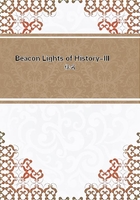
第33章
They gave the only education the age afforded. There was usually a school attached to every convent, and manual labor was shortened in favor of students. Nor did the monks systematically and deliberately shut the door of knowledge against those inclined to study, for at that time there was no jealousy of learning; there was only indifference to it, or want of appreciation. The age was ignorant, and life was hard, and the struggle for existence occupied the thoughts of all. The time of the monks was consumed in alternate drudgeries and religious devotions. There was such a general intellectual torpor that scholars (and these were very few)were left at liberty to think and write as they pleased on the great questions of theology. There was such a general unanimity of belief, that the popes were not on the look-out for heresy. Nobody thought of attacking their throne. There was no jealousy about the reading of the Scriptures. Every convent had a small library, mostly composed of Lives of the saints, and of devout meditations and homilies; and the Bible was the greatest treasure of all,--the Vulgate of Saint Jerome, which was copied and illuminated by busy hands. In spite of the general ignorance, the monks relieved their dull lives by some attempts at art. This was the age of the most beautiful illuminated manuscripts. There was but little of doctrinal controversy, for the creed of the Church was settled; but pious meditations and the writings of noted saints were studied and accepted,--especially the works of Saint Augustine, who had fixed the thinking of the West for a thousand years. Pagan literature had but little charm until Aristotle was translated by Arabian scholars. The literature of the Church was puerile and extravagant, yet Christian,--consisting chiefly of legends of martyrs and Lives of saints. That literature has no charm to us, and can never be revived, indeed is already forgotten and neglected, as well it may be; but it gave unity to Christian belief, and enthroned the Christian heroes on the highest pedestal of human greatness. In the monasteries some one of the fraternity read aloud these Lives and Meditations, while the brothers worked or dined. There was no discussion, for all thought alike; and all sought to stimulate religious emotions rather than to quicken intellectual activity.
About half the time of the monks, in a well-regulated monastery, was given to singing and devotional exercises and religious improvement, and the other half to labors in the fields, or in painting or musical composition. So far as we know, the monks lived in great harmony, and were obedient to the commands of their superiors. They had a common object to live for, and had few differences in opinion on any subject. They did not enjoy a high life, but it was free from distracting pleasures. They held to great humility, with which spiritual pride was mingled,--not the arrogant pride of the dialectician, but the self-satisfied pride of the devotee. There was no religious hatred, except towards Turks and Saracens. The monk, in his narrowness and ignorance, may be repulsive to an enlightened age: he was not repulsive to his own, for he was not behind it either in his ideas or in his habits of life. In fact, the more repulsive the monk of the dark ages is to this generation, the more venerated he was by bishops and barons seven hundred years ago; which fact leads us to infer that the degenerate monk might be to us most interesting when he was most condemned by the reformers of his day, since he was more humane, genial, and free than his brethren, chained to the rigid discipline of his convent. Even a Friar Tuck is not so repulsive to us as an unsocial, austere, narrow-minded, and ignorant fanatic of the eleventh century.
But the monks were not to remain forever imprisoned in the castles of ignorance and despair. With the opening of the twelfth century light began to dawn upon the human mind. The intellectual monk, long accustomed to devout meditations, began to speculate on those subjects which had occupied his thoughts,--on God and His attributes, on the nature and penalty of sin, on redemption, on the Saviour, on the power of the will to resist evil, and other questions that had agitated the early Fathers of the Church. Then arose such men as Erigena, Roscelin, Berenger, Lanfranc, Anselm, Bernard, and others,--all more or less orthodox, but inquiring and intellectual. It was within the walls of the cloister that the awakening began and the first impulse was given to learning and philosophy. The abbey of Bec, in Normandy, was the most distinguished of new intellectual centres, while Clairvaux and other princely abbeys had inmates as distinguished for meditative habits as for luxury and pride.
It was at this period, when the convents of Europe rejoiced in ample possessions, and their churches rivalled cathedrals in size and magnificence, and their abbots were lords and princes,--the palmy age of monastic institutions, chiefly of the Benedictine order,--that Saint Bernard, the greatest and best representative of Mediaeval monasticism, was born, 1091, at Fontaine, in Burgundy.